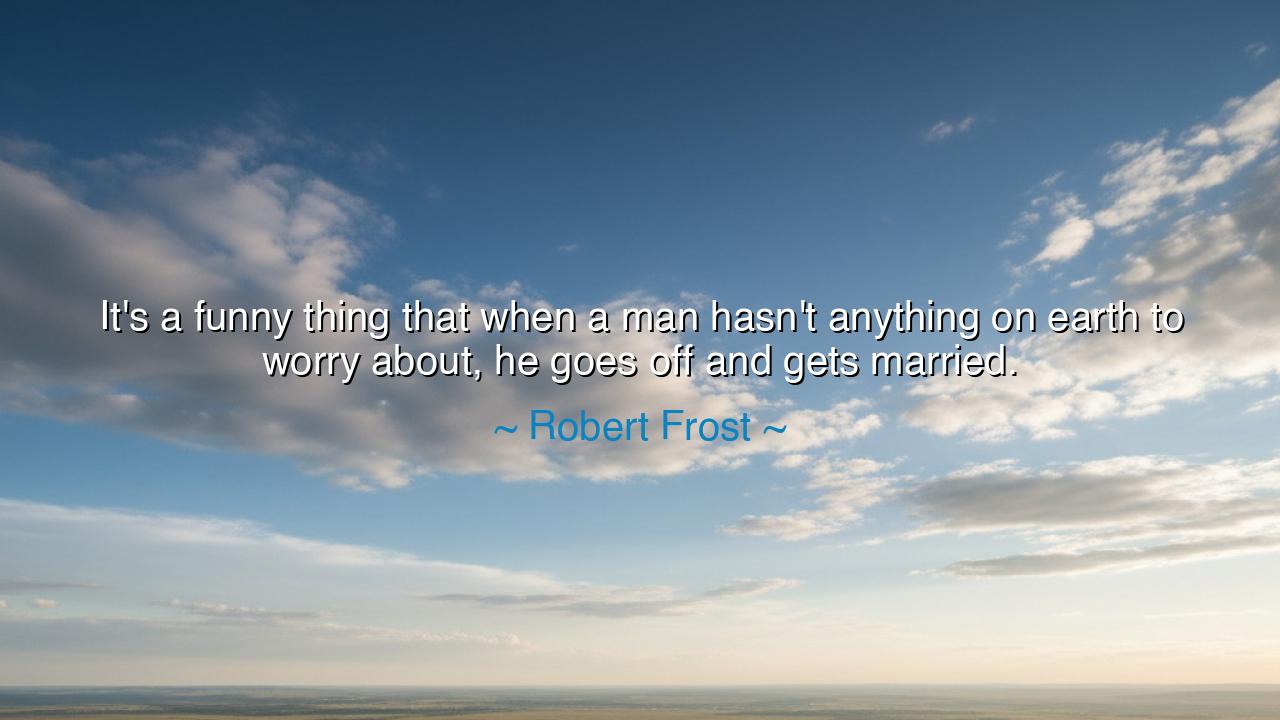
It's a funny thing that when a man hasn't anything on earth to
It's a funny thing that when a man hasn't anything on earth to worry about, he goes off and gets married.






In the words of Robert Frost, “It’s a funny thing that when a man hasn’t anything on earth to worry about, he goes off and gets married.” — there lies both humor and truth, both jest and revelation. Beneath the surface of this wry observation is a reflection on the restless nature of the human spirit, the desire for meaning even when comfort has been achieved. Frost, with his characteristic blend of wit and wisdom, unveils a paradox: that when life grows too easy, man seeks challenge; when peace surrounds him, he yearns for purpose — and nowhere is this longing more embodied than in the sacred, complex bond of marriage.
The meaning of this quote rests not in cynicism, but in understanding human nature’s endless hunger for growth. When Frost speaks of a man with “nothing to worry about,” he is describing not only material ease but spiritual complacency — the stillness that breeds stagnation. To “go off and get married,” then, is not simply to seek companionship, but to reawaken life’s struggle and depth, for in love one finds both joy and burden, freedom and responsibility. Marriage, like all great endeavors, is both blessing and trial. Frost’s humor disguises a truth known to every age: that man is not content to live without friction, for it is friction that shapes the soul.
The ancients, too, understood this. The philosopher Aristotle once wrote that man, by nature, seeks the “good life,” not the easy life — that happiness is found not in idleness but in activity, in striving toward virtue. Marriage, in its truest form, is one of the greatest of such strivings, for it demands patience, humility, and courage. It is not for the faint-hearted, nor for those who wish to remain untouched by life’s storms. Frost’s jest reminds us that the man who dares to love, dares also to suffer — yet it is that very suffering that gives meaning to existence. For love, though perilous, is the only labor worth undertaking.
Consider the story of Odysseus, the hero of the ancient seas. After ten years of war and ten more of wandering, he longed not for endless glory, but to return to his wife, Penelope. Their reunion was not one of ease, but of renewal — a rediscovery of purpose after struggle. Odysseus did not seek marriage because it was easy; he sought it because it was real. In Penelope, he found both love and labor — the daily work of faith, loyalty, and endurance. Frost’s words echo this ancient wisdom: that even the man who has conquered the world must still confront the wild, beautiful challenge of intimacy.
The origin of Frost’s insight comes from his lifelong meditation on the dual nature of life — joy and sorrow, work and rest, solitude and union. He knew that all creation moves in contrast. To live without challenge is to decay; to live with love is to grow. His humor, therefore, is not mockery of marriage, but reverence for its transformative power. When a man “goes off and gets married,” he steps willingly into uncertainty — not because he must, but because something in him longs to be tested, to rise beyond himself, to give rather than merely exist.
The lesson we draw from this is timeless: embrace the burdens that give meaning to your days. Do not fear commitment, whether to a person, a purpose, or a dream. For ease breeds emptiness, but responsibility awakens the soul. To bind oneself to love, to duty, or to creation, is to become more fully human. The man who flees from challenge remains shallow; the one who accepts it, even laughingly, finds wisdom.
Therefore, my friends, take Robert Frost’s humor as both jest and guidance. When life feels too calm, do not cling to the comfort of stillness. Seek what demands something of you — what stretches you, humbles you, refines you. For as Frost implies, even the wisest of men, when faced with the emptiness of ease, will yearn for the sacred weight of love. To love deeply is to live bravely; to commit is to choose meaning over ease, destiny over comfort.
And so, when Frost laughs and says, “It’s a funny thing,” he laughs as the sages laughed — gently, knowingly. For he sees that man, in his heart, does not want a life free of worry, but a life filled with purpose. And perhaps, in that quiet laughter, he reminds us that the greatest act of courage is not to conquer the world, but to open one’s heart to another, and to find, in that shared imperfection, the perfect work of being alive.






AAdministratorAdministrator
Welcome, honored guests. Please leave a comment, we will respond soon